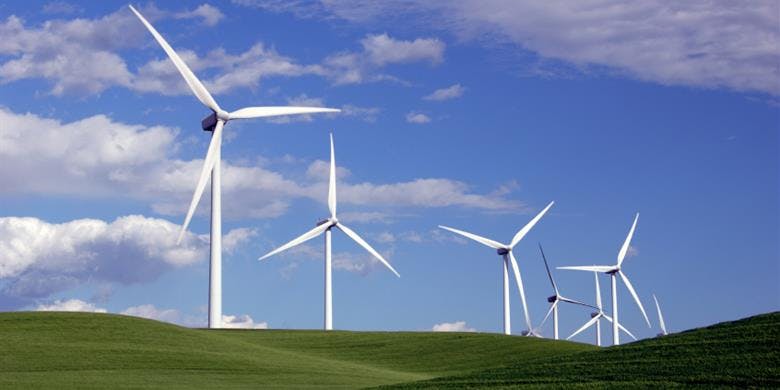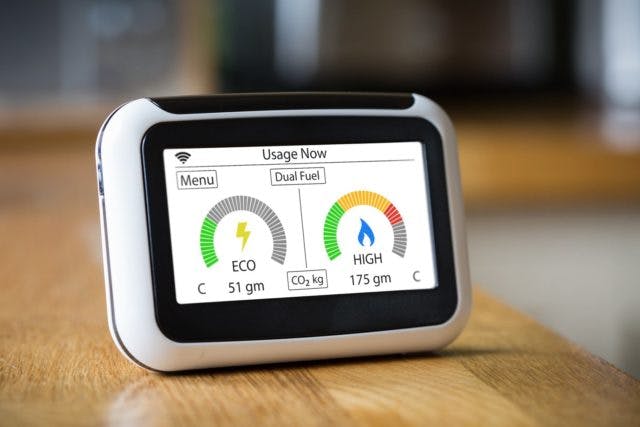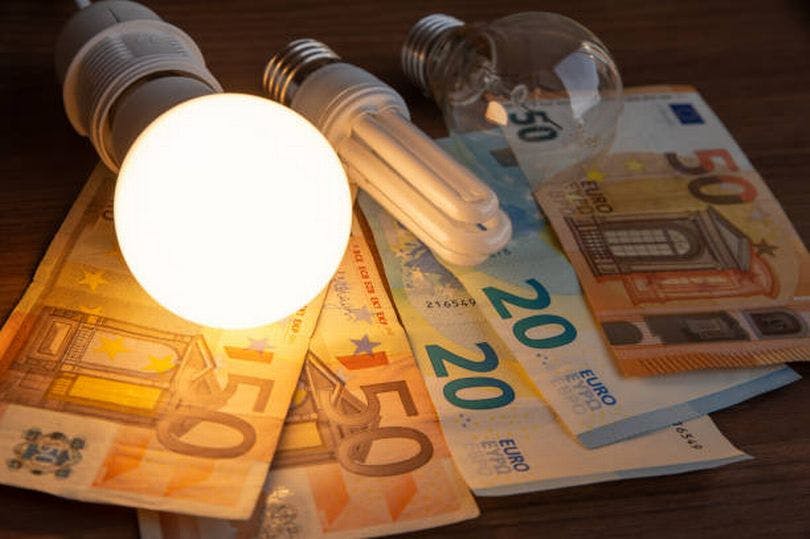Your complete guide to gas and electricity in Ireland
Here’s how to make sense of the energy market, find the best gas and electricity prices, save energy and cut bills.
What’s in this guide?
Part 1
Ireland’s energy market
Gas and electricity providers in Ireland
There are 12 active gas and electricity suppliers covering all regions in Ireland.
Most suppliers offer gas and electricity, but some focus solely on renewable electricity or provide pay-as-you-go energy only. Some, like new supplier Yuno energy, are digital-first.
The number of suppliers and absence of a price cap ensures price competition is high and introductory discounts are on offer for most residential customers.












Electricity prices in Ireland
The price of electricity is ever-changing because both global and national factors dictate the cost of your electricity bill.
The cost of electricity depends not only on the supply and wholesale cost but on other factors like the PSO Levy, VAT and what type of plan you’re on.
Currently, the cheapest electricity plan in Ireland based on an estimated annual bill (EAB) is €1,239, so an average electricity customer could save up to €516 a year by switching from a standard tariff to the cheapest deal on the market.
Are electricity prices falling?
Post-pandemic demand and the Russian war in Ukraine led to a surge in wholesale energy prices in 2021 and 2022, with electricity prices reaching record highs in Ireland in August 2023.
Though prices have been started to fall - with another round of cuts expected later this year - they’re still sky-high and almost double what they were in 2021.
What is the PSO Levy?
The Public Service Obligation Levy (PSO Levy) has to be paid by all electricity customers and covers the costs of generating sustainable and renewable energy in Ireland. The PSO Levy is set annually and used by the Government to meet its national policy objectives of providing:
- renewable energy
- indigenous fuels
- security of electricity supply
In July 2023, the PSO levy for 2023/24 set to €0. This came into affect for customers on Oct 1st, 2023.
Gas prices in Ireland
The price we pay for gas, like electricity, fluctuates depending on what’s happening in the global markets and closer to home. As well as wholesale and network costs, Carbon Tax and VAT is added to bills.
Although gas prices are sky-high at the moment, the good news is that if you’ve been on a standard tariff for over 12 months, you can likely reduce the costs by switching.
Currently, the cheapest electricity plan in Ireland, based on an estimated annual bill (EAB) is €1,180 so an average gas customer could save up to €301 a year by switching from a standard tariff to the cheapest deal on the market.
What is the Carbon Tax?
Introduced in 2010, the Carbon Tax is intended to reduce carbon dioxide emissions and is applied to carbon-emitting fuels such as coal, peat, oil and natural gas.
The Carbon Tax is based on the amount of carbon dioxide a fuel emits when used, so households using heating oil, coal, and gas to heat their homes pay the levy.
Gas suppliers in Ireland are obliged to add the charge to all customers’ bills. The carbon tax adds around €122 (inc. VAT) to the average Irish household’s annual gas bill.
Electricity
What’s the average electricity bill?
The average annual electricity bill on a standard tariff in Ireland is €1,755 if you live in a typical three-bedroomed house.
Gas
What’s the average gas bill?
The average annual gas bill on a standard tariff in Ireland is €1,482 if you live in a typical three-bedroom house.
Start saving on your gas and electricity bills
Part 2
Types of energy plans and tariffs
Most gas and electricity providers offer variable rate tariffs, which means that prices can go up and down and the price quoted when you apply may not stay the same.
There are currently no fixed-rate energy plans on the market, and with prices rising they are unlikely to return.
Here’s the range of plans you may come across:
- Dual fuel plans: Gas and electricity provided by one supplier and paid for with a single bill. Combining both may work out cheaper if you get a discount.
- Smart meter tariffs: Gain control over energy costs and plan your energy usage. You’ll need to sign up for a ‘smart meter plan’ and have a smart meter.
- NightSaver tariffs: Good for homes which use more electricity at night, such as storage heaters. You’ll need a NightSaver meter.
- Time of Use (ToU) tariffs: You’ll pay various electricity rates at different times of the day or week instead of a ‘flat’ same rate tariff. You’ll need a smart meter.
- Pay As You Go plans: Also known as Prepay energy, you’ll need to pay for the energy upfront by topping up a prepayment meter online with a key, card or tokens.
- Green plans: These mean your home gets supplied with 100% renewable energy or a fuel mix. These tariffs may also contribute to environmental projects.
- Variable rate tariffs: This type of rate fluctuates in line with the market. When prices rise, your bill will too, but it will drop when rates fall.
- Fixed-rate tariffs: Guarantees your energy price for a set period - up to 12 months. You’ll likely get charged an exit fee if you leave early.
Are smart meters worth it?
A smart meter won’t automatically cut your bills, but they provide many benefits for homeowners and the environment. Here’s some of the advantages:
What is Pay As You Go electricity?
It’s electricity paid for in advance. You’ll only pay for the energy you need, so there are no bills.
Unlike the standard payment method of bi-monthly or monthly bills to cover usage, a prepayment meter requires topping up before you can use energy.
Pay As you Go (PAYG) is also known as prepaid or prepay electricity.
Pros and cons of prepay energy
Prepay energy is not necessarily cheaper, but it’s an option worth considering if you struggle to keep up with bills or want to take control of your spending.
There are several advantages and disadvantages of prepaid gas and electricity. Here are the main ones:
Pros
Cons
Is a NightSaver plan for you?
A NightSaver plan allows customers to enjoy reduced price electricity at night.
A specialist meter records your usage during the day and night separately, so you pay cheaper rates for electricity during NightSaver hours, which are 11pm till 8am in Winter and 12am till 9am during Summer.
You’ll save money with a NightSaver meter if you use more than 25% of your household electricity overnight; about four units if you use an average of 12 units per day. Households with night storage heaters, an electric car or a heat pump will likely benefit from a NightSaver plan.
Renewable energy plans in Ireland
A renewable or green energy plan is when an energy supplier promises to match all or some of the energy a consumer uses with renewable energy.
The Commission for Regulation of Utilities (CRU) requires that gas and electricity suppliers disclose the sources they use to generate their energy each year.
The latest CRU report Fuel Mix Disclosure 2022 reveals the gas and electricity suppliers in Ireland offering 100% renewable energy.
How green is this energy?
Despite a growing number of renewable energy options, Ireland still heavily relies on fossil fuels.
As we only have enough wind farms and solar parks to supply about 30-40% of the country’s electricity needs, suppliers will try to reach 100% renewable energy by investing in renewable energy abroad, and obtaining green certificates.
This is done under a Europe-wide Guarantees of Origin (GO) scheme.
So where a supplier tariff refers to 100% green energy, this can also mean contractual support for renewables, rather than the physical delivery of renewable electricity.
Compare gas and electricity plans for better prices
Part 3
Choosing an energy supplier in Ireland
Why compare energy suppliers?
You’ll likely save money by switching if you haven’t changed your energy provider in the last 12 months.
This is because many suppliers offer discounts to new customers, but when the introductory period ends, you’ll pay the standard rate, which is often higher.
When your contract ends, it makes sense to shop around, compare plans and switch to a better deal.
How much could you save?
The average electricity customer could save up to €516 a year by switching from a standard tariff to the cheapest deal on the market, and the average gas could save up to €301 by switching to the cheapest deal.
On average, you could save €779 by switching if you have a dual fuel tariff for your gas and electricity.
How Switcher.ie can help you
Switcher.ie is a free, impartial and independent price comparison and energy switching service in Ireland. We compare gas and electricity suppliers to help you:
We’re accredited by the Commission for Regulation of Utilities (CRU), which means the CRU endorses Switcher.ie as an independent, impartial and accurate source of information.
Comparing gas and electricity suppliers
You can find a better deal by comparing energy suppliers and tariffs using our gas and electricity comparison tool. It takes less than 10 minutes to find a cheaper plan and Switcher.ie will manage the whole switching process for you.
Enter your details into our gas and electricity comparison tool and we’ll show you all available gas, electricity and dual fuel plans to you. You’ll be able to compare:
Which energy suppliers do Switcher.ie compare?
We compare gas and electricity plans and prices of all the active energy suppliers in Ireland. Visit our suppliers page for more information about each energy provider.












Discover the cheapest suppliers in Ireland
Part 4
Switching your energy supplier
1
Search
Simply tell us about your gas & electricity usage so we can search the market.
2
Compare
Choose the best deal for your needs from Ireland’s top energy suppliers.
3
Switch
Apply to switch and sit back while your new supplier takes care of everything.
For a quick and easy switch, use Switcher.ie’s free, gas and electricity comparison tool.
Simply tell us about your current energy plan and the tariff type you want, and we’ll show you the cheapest deals and best suppliers. You can then choose your new plan and check the relevant information.
Once you are happy with your choice, just provide your details and confirm your switch and your new supplier will contact you and do the rest.
Switch and save up to €779 on your energy bills
It only takes a few minutes to find a cheaper deal and start saving
When is the best time to switch?
You’re free to switch energy providers without penalty when your contract term ends, usually after 12 months. However, you’ll get charged an early exit fee if you leave your contract before the term finishes.
Most energy suppliers charge an early exit fee of €50 per fuel, so if you’re a dual fuel customer, it could cost up to €100.
What you need to know
How long will the switch take?
It usually takes around 14 days for your switch to be carried out. The completion time depends on your old and new supplier, but you’ll be updated with progress and informed once the switch is complete.
What happens after you’ve switched?
You should receive a welcome pack and plan information from your new supplier. They will also be in touch by email to update you on progress.
Do you need to contact your supplier?
No, once your new supplier receives and confirms your application, they’ll handle the switch with your old supplier, so you don’t need to contact them.
Will there be an interruption to supply?
No, all energy suppliers use the same network and pipes to provide energy to your home, so you won’t have any interruption in supply. Apart from receiving your bills from another supplier and a smaller bill, nothing else will change.
Learn more about switching your supplier
Part 5
How to save energy and cut bills
Quick tips to save home energy
If you’re not ready to switch, you’ll save money on your gas and electricity bills by reducing your energy usage at home. Making your home more energy efficient can also have environmental benefits.
Here are five tips to reduce your use and improve your home’s energy efficiency.
- Pull the plug and don’t leave your appliances on standby
- Turn your heating down, just one degree can make a difference
- Get smart and use timers and smart meters to monitor and control your use
- Use your kettle, fridge and oven efficiently; use minimal water and heat to cook
- Reduce your use of energy-sapping things like tumble dryers and power showers
To discover what appliances use the most energy, as well as how to increase your home’s energy efficiency and cut your energy bills, visit our guide Top energy saving tips to save money.
What’s the cheapest way to pay?
Some suppliers offer discounts of up to 3% if you register for online billing and up to 5% if you pay by Direct Debit. If you have an internet connection and can set up a Direct Debit with your bank, it makes sense to take advantage of these incentives.
Even greater discounts are offered if you sign up for a Dual Fuel plan; so if you use gas and electricity, it’s cheaper to get both from the same energy provider.
How to spread the cost of your energy bill
Talk to your supplier about a payment plan if you struggle with higher energy costs during winter or just want to budget more effectively.
These payment plans allow you to spread the cost of your electricity or gas bill into twelve fixed, monthly direct debit payment amounts. Your supplier may also include a 10% contingency to allow for any electricity or gas price changes, plus any other factors.
Can you get support to pay energy bills?
If you’re on social welfare, Fuel Allowance helps cover the cost of heating your home. It’s paid weekly, but if you are on certain benefits, you can claim it in two lump sums. Learn more about what you can get and who can apply in our guide How to claim the Fuel Allowance.
Our guide What help can you get paying your energy bills? summarises other support available in Ireland.
Will you still get your support if you switch?
Yes, if you’re receiving the fuel allowance or another government grant, just contact the department of social protection to let them know you’ve switched.
Electric Ireland, Bord Gáis Energy and Flogas customers can have the allowance automatically deducted from their bills each month, which means no additional steps when switching.
What about the electricity credit?
In Budget 2024, the Government announced that residential electricity customers would get a €450 credit to help with electricity bills.
It will be paid in three instalments of €150; the first on 1st December 2023, the second on 1st January 2024 and the third on 1st March 2024.
You won’t miss out on the government’s one-off electricity credit either if you switch plans. Your old supplier can apply it to your closing bill or pay it into your bank account, so you won’t lose a penny of support.
Managing your energy payments
Whether you get a paper bill in the post or an online statement, your energy bills contain the same information. Most suppliers give you the option of paperless billing and online account management.
Several energy providers also offer a mobile app to manage your bills and monitor usage.
How your energy bill is calculated
You may have seen the Estimated Annual Bill (EAB) rate when comparing suppliers; however, the amount you pay is calculated on ‘actual’ gas and electricity use. It’s based on the previous month’s usage or two months if you get billed bi-monthly.
Energy usage is measured in kilowatt-hours (kWhs), and each kWh is called a unit. The unit rate is the cost you pay per kWh, so the amount you’re charged is calculated by multiplying your usage by the unit rate.
You can track how much power you’re using and calculate your energy spend by checking your gas, electricity or smart meter. Learn more about meter readings in our guide How to read your electricity and gas meters.
On top of consumption charges, other factors like the standing charge, levies and VAT are added to your bill to make up the total amount payable. Read our guide What is the average energy bills in Ireland? to learn more about your gas and electricity costs.
What to do if you're struggling to pay
If you’re struggling to afford your gas and electricity bills, contact your supplier to discuss ways to cope with the payments. Your supplier is obliged to help and negotiate a plan that works for both of you
Before a supplier can disconnect you, they must agree on a payment arrangement that suits your circumstances while avoiding a situation where your debt worsens. This could involve moving you to a payment scheme like Level Pay or installing a Pay-As-You-Go meter.
Learn more about how you are protected by the Energy Engage Code and the CRU.
Discover how to save energy to cut electricity and gas costs
Energy in Ireland FAQs
How do I make a complaint to my supplier?
If you have a complaint about your energy supplier or the service you’re receiving, in the first instance you should raise your complaint directly with them and follow their complaints process.
Details of how to complain can usually be found on the supplier’s website, within their Terms & Conditions or Code of Conduct.
If you can’t resolve your complaint with the supplier, you can approach Citizens Information for advice or escalate the complaint to the Commission for Regulation of Utilities (CRU).
How do I find out who my energy supplier is?
You can find out who your electricity supplier is by looking at the details on your recent energy bill. If you don’t have a bill available, or if you’ve just moved home and aren’t sure which utility company supplies your new property, contact:
- ESB Networks on 1850 372 757 or
- email ESB on esbnetworks@esb.ie
For gas, contact:
- Gas Networks Ireland on 1800 464 464 or
- Use the Gas Networks Contact Us form
What does EAB mean?
When comparing energy plans, you’ll come across the term Estimated Annual Bill (EAB). The EAB is an estimate of the average household energy cost for a year and includes VAT and other charges such as the Standing Charge and PSO Levy.
It’s based on whether a customer is urban or rural, their meter type and any discounts. It’s calculated using average electricity consumption of 4,200kWh and average gas consumption of 11,000kWh.
Do comparison websites earn commission from suppliers?
Switcher.ie has commercial arrangements in place with some suppliers, which means we receive a small commission payment every time you switch gas or electricity suppliers through Switcher.ie.
This helps to make the switching process as convenient as possible. In some cases, we can offer exclusive deals that are not available directly from the supplier.
You can learn more about Switcher.ie on our About Us page.
Can I switch if I'm on the Special or Priority Services register?
Yes, you can still switch if you have a specific need like visual impairment or a medical condition where continuity of energy supply is critically important. Indicate your specific needs on the switching form and your new supplier will ensure you’re registered.
We’re proud to be trusted by the CRU as an impartial and accurate supplier of energy comparisons.






